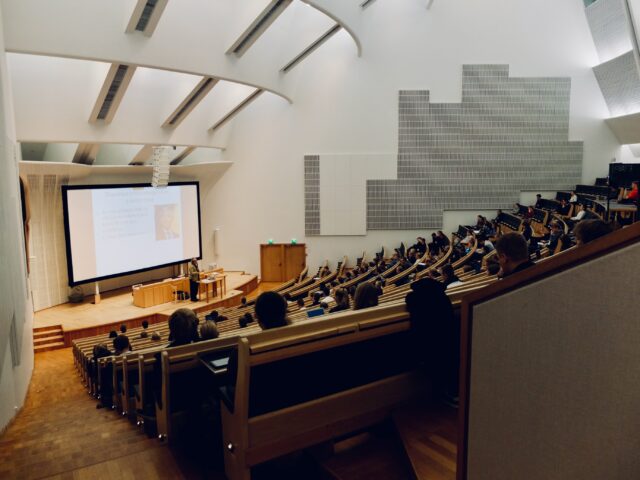At St Jerome’s University and MacEwan University, residential school survivors and other community members gathered together as Pope Francis embarked on his “pilgrimage of penance” in Canada. At SJU, people gathered to take part in a ceremonial fire and watch a livestream of the apology. “When we gathered today, that circle made it easier for them to share this experience together and conclude it with the smudging ceremony. So they didn’t take all that pain with them,” explained former Chippewas of the Thames First Nation Elder Myeengun. At MacEwan, volunteers at the kihêw waciston Indigenous Centre assembled care packages for survivors ahead of the Pope’s visit to Edmonton. Each package contained Indigenous tea, a floral scarf for comfort, a smudge kit, and contact numbers for support services. At the University of Manitoba, Indigenous student Kathleen McKenzie penned a personal reflection about the meaning of the visit in the context of her life.

Indigenous Top Ten News
July 27, 2022
The Chiefs of Ontario have announced the launch of new Education Agreement (EA) resources. Chiefs of Ontario explains that the Government of Ontario amended the Education Act and its regulations in 2019, but that these amendments did not eliminate the need for EAs altogether as they still leave First Nation schools underfunded. EAs help to formalize relationships and agreements between a First Nation and the Board, hold the Board to meeting certain standards and providing specific languages or cultural courses, and more to help achieve high-quality, equitable educational services. The resources feature a dedicated toolkit for negotiating EAs with Ontario school boards, as well as an informational video, an overview document, and an agreement template. “Historically, Ontario schools have not been successful in providing equitable education services to First Nations students,” said Ontario Regional Chief Glen Hare. “Through these agreements, First Nations and provincial school boards will be able to support the cultural connections, diversity, and unique needs of First Nations students while promoting success for future generations.”
North Island College and Central Coast First Nations have partnered on a pilot Pacific geoduck aquaculture project. The project will focus on increasing geoduck aquaculture on BC’s coast with a goal of supporting the Central Coast First Nations in developing economic opportunities. The research and training will benefit the communities and provide NIC students with unique learning opportunities. The project will monitor each site’s characteristics and conditions in the first year and the growth and survival of geoducks in the second and third years. “We complement all partners in supporting the aspirations of the Central Coast First Nations to develop this important opportunity in a way that will engage the experience of their stewardship offices, employ traditional ecological knowledge,” said President of the Central Coast Indigenous Resource Alliance Rich Chapple.
A historic regional education agreement was signed on Kahnawà:ke Mohawk Territory between the First Nations Education Council, FNEC’s 22 First Nations member communities, and Indigenous Services Canada. Under the agreement, approximately $1.1B over five years will be provided to the communities to fund education, including building culturally adapted programs, supporting school transportation, and the recruitment and training of over 600 teachers and other staff. Through this agreement, APTN News reports that the communities will have full responsibility over the schools and their curriculum. “This is a major step forward for our people, and an honour to have signed this monumental agreement in Kahnawà:ke Mohawk Territory,” said Kahnawà:ke Grand Chief Kahsennénhawe Sky-Deer. “This agreement will provide Kahnawà:ke with the funding and assistance required for the next five years to ensure our children and young adults get an education that embodies our roots, language, and culture.” The agreement will be in effect until March 2027, when it will be evaluated for renewal.
The Weengushk Film Institute (WFI), Canada’s first Indigenous film school, recently celebrated its 20th anniversary. The evening included a presentation on the design of the new WFI school building, which was created by the architects Elastico Farm in collaboration with KFA Architects and planners. The new building will feature cutting-edge screen designs and include classrooms, workspaces, and a theatre. “WFI has brought a light of hope for many of our Indigenous and diverse youth,” said school founder Dr Shirley Cheechoo. The celebration was followed by the three-day Weengushk International Film Festival.
NorQuest College, the University of Winnipeg, and the University of Victoria recently launched new programs. NorQuest and The CommAlert Group partnered to launch a free, four-month IndTech program for Indigenous youth who are interested in a career in technology. The program teaches technical skills in areas such as data management, software literacy, and teamwork, and includes a paid internship. UWinnipeg has launched three new Indigenous language certificates that each teach proficiency in a local Indigenous language and provide students with the historical context on language revitalization. UVic has announced the co-creation and launch of a custom MBA in Indigenous Reconciliation, which is being developed through a partnership with the BC Association of Aboriginal Friendship Centres (BCAAFC). The MBA will have a closed-enrolment model with students selected by BCAAFC and BC.
Postsecondary institutions and a provincial department recently hosted camps to give Indigenous students a taste of higher education. In Nova Scotia, the Department of Education and Early Childhood Development is supporting the Learning with Wskitqamu camp, which provides land-based hands-on experiences to Mi’kmaw and Indigenous youth. Dalhousie University’s SuperNOVA program and the Ulnooweg Education Centre have partnered to offer Melkiknuawti, a land-based learning program. The program focuses on giving Indigenous youth STEM opportunities aligned with Indigenous knowledge. Virtual Ventures at Carleton University worked with Actua to deliver the Mashkikiikaagen Indigenous Youth in STEM (InSTEM) Land Summit, which provides Indigenous high school students with a for-credit land camp experience. The University of Alberta hosted a Young Indigenous Women’s Circle of Leadership camp that will teach students the Cree language and provide opportunities for cultural engagement.
Renfrew County Catholic District School Board (RCCDSB) has approved its 2022-23 budget, which includes several changes and investments. The board is de-streaming all grade nine courses as part of an equity-focused initiative. RCCDSB has also announced that it will continue to invest in the grade 11 English course Indigenous Understanding of Contemporary First Nation, Métis, and Inuit Voices, which has the course expectations of a traditional English course but is built on anchor pieces and reading materials from Indigenous authors. The Indigenous graduation coach will also continue to be supported given the number of Algonquins of Pikwakanagan students enrolled in the school board. “We are proud to invest in what’s important, the students at RCDSB,” said RCCDSB Vice Chair David Howard.
The Grade 4 class at Leo Ussak School in Rankin Inlet have written and published an adaptation of the Three Little Pigs called The Three Hunters. “We spent about six weeks — like a half an hour after lunch every day — talking about our story, writing it, rewriting it, editing it, until we had something that we all thought was pretty great,” said Grade 4 teacher and vice-principal Raymond Gianfresco. “I sent the story home with all the students at the time, and I thought it was awesome, so I sent it to Inhabit (Media) and they liked it as well.” The book is set before colonization and follows brothers Akagaq, Tiriaq, and Akkiutaq as they build three shelters – a tent, a snowdrift, and an iglu – that the wind threatens to destroy. The proceeds of the book will go toward the school and the Ikurraq Food Bank.
Students at Mohawk College, Confederation College, and Jens Haven Memorial School have engaged in boat building to connect with their roots and culture. At Mohawk, master canoe-maker Chuck Commanda from Kitigan Zibi Anishinabeg, guided Indigenous students in building a wigwas tchiiman (birch bark canoe) using his ancestors’ methods. The project received a $30K sponsorship from Breakwater Financial. At Confederation, a group of students recently built and launched a canoe, named Wildflower, that was made out of birch bark, cedar, and watap (spruce root). The students also studied the surrounding land according to western science, earning a preparatory certificate demonstrating STEM-related skills. At Jens Haven, a grade 8 class of 15 students spent the winter building a synthetic skin kayak and recently braved the rain to try it on a pond. “Most adults I know would struggle to finish one,” said Nunatsiavut’s Kayak Revival lead Noah Nochasak. “So the fact that people that are 13 follow directions and literally can tell you stories about how they made the kayak, that’s saying something.”
